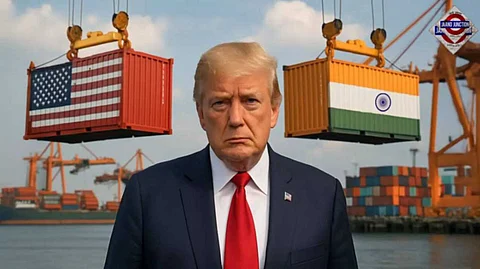

Walmart, one of America’s biggest retail chains, has halted several orders from Indian textile suppliers after US President Donald Trump doubled import tariffs on Indian goods to 50%.Exporters say the move has messed up delivery plans, stopped shipments, and could make India’s clothing industry lose billions in business.
India is the sixth-largest textile and apparel exporter in the world, and the United States is its single biggest market. In the financial year ending March 2025, the US accounted for about 28% of India’s total textile and clothing exports, valued at $36.61 billion. Industry estimates warn that the new tariff will push up costs for American buyers like Walmart by 30–35%, potentially reducing US-bound orders by up to 50%. This could mean a loss of $4–5 billion for Indian exporters.
Exporters say Walmart has asked them to pause certain shipments and consider shifting production to countries with lower duties. Gokaldas Exports, which supplies several large US retailers including Walmart, confirmed discussions with buyers about alternative sourcing.
In Tiruppur, Tamil Nadu– one of the world’s textile manufacturing hubs, a supplier said his Walmart order of cotton T-shirts and dresses worth $80,000 was stopped immediately after the tariff announcement. “They told us flat out that they can’t pass the extra costs to their customers and want us to lower the price instead,” the exporter said on condition of anonymity.
Some manufacturers are now weighing whether to offer steep discounts to prevent unsold stock from piling up. However, industry veterans warn that such cuts may not be enough to stop major buyers like Walmart from shifting orders to Bangladesh or Vietnam, where the US tariff is only 20%.
Rahul Mehta, chief mentor of the Clothing Manufacturers Association of India, which represents 20,000 exporters, said, “A 50% duty makes Indian apparel 30–35% more expensive than alternatives. Why would Walmart or any retailer pay so much more? If orders keep getting cancelled, factories will shut and people will lose jobs.”
The tariff hike is part of a US penalty over India’s continued purchase of Russian oil. The first 25% hike took effect on Thursday, with another 25% scheduled for August 28. In his executive order, President Trump said the measure was “necessary” because India is “directly or indirectly importing Russian Federation oil.”
India’s Ministry of External Affairs (MEA) has condemned the decision, calling it “unfair, unjustified and unreasonable.” The ministry stressed that India’s oil imports are based on market conditions and aimed at ensuring affordable energy for its 1.4 billion people.
The MEA pointed out that India turned to Russian oil after traditional suppliers diverted shipments to Europe during the Ukraine conflict in 2022 — a move the US had initially supported to stabilise global markets.
India argues it is being unfairly singled out. The MEA noted that the US still imports items such as uranium hexafluoride, palladium, fertilisers, and chemicals from Russia. It also pointed to the European Union’s €67.5 billion trade in goods with Moscow in 2024, which far exceeds India’s total trade with Russia. The EU also imported record volumes of Russian LNG last year.
“In this context, targeting India is unjustified,” the ministry said, adding that the government will take “all necessary steps” to safeguard the country’s national interests and economic security.
Walmart’s supply chain strategy is built on competitive pricing, and India has long been a key supplier for both its retail stores and its online marketplace. Industry insiders say the 50% tariff threatens that balance, making it cheaper for the retailer to source from countries like Bangladesh, Vietnam, and even Central American nations that have preferential trade terms with the US.
Analysts warn that if Walmart shifts a significant share of its orders away from India, it could trigger a ripple effect. Smaller suppliers who rely on Walmart’s high-volume contracts could be forced to cut production, leading to layoffs and factory closures in India’s textile hubs.
The tariff dispute has pushed Walmart and its Indian suppliers into a tense stand-off. With shipments frozen and cost negotiations underway, both sides are under pressure: Walmart to keep prices competitive in the US market, and Indian exporters to avoid losing a major customer. Unless the trade tension eases, India’s $36 billion textile export sector could face a prolonged hit and Walmart’s shift toward cheaper markets may become permanent.
